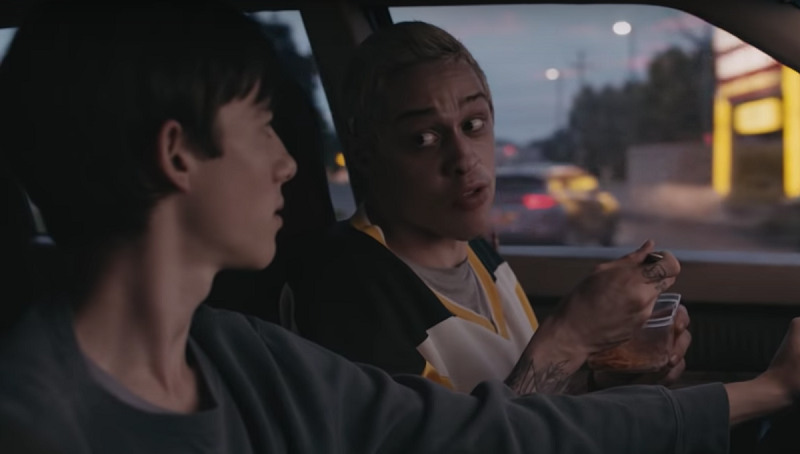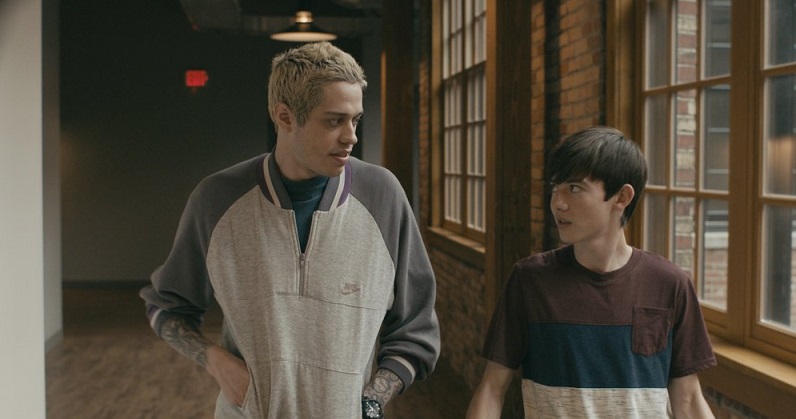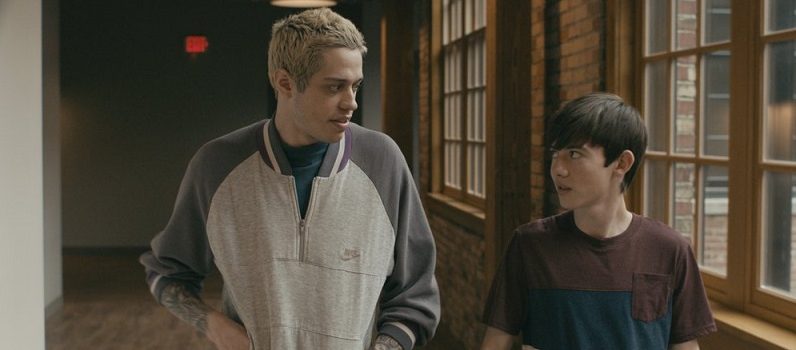When casting an individual to portray a man who has failed to leave his teenage years in the rear view mirror, Big Time Adolescence scored immensely. Pete Davidson is Zeke and for writer-director Jason Orley, the actor and the role was a match made in heaven. Toss in the SNL stars’ innate comic timing and there is much to like about the story. It hits close to home for this guy … as I had my own Zeke when I was in high school.

Big Time Adolescence follows Mo (brilliantly portrayed by Griffin Gluck), who first met Zeke when the teenager was dating his older sister, Emily (Kate Harris). Mo couldn’t have been more than ten. Over the years, Emily and Zeke ran into trust issues and eventually broke up. What was made crystal clear by Orley, through his well-crafted script, was that there was a truly organic friendship between Mo and Zeke that neither thought should stop. Simply because Emily didn’t want to see Zeke anymore, why should these two unlikely pals stop hanging out?
The film jumps to when Mo is fifteen, almost sixteen, and Zeke is in his twenties and has no intention to “grow up.” He’s got a cool house to live in (thanks to his grandma, who left it to him when she passed away). He’s got a girlfriend Holly (Sydney Sweeney) who dotes on him and his friends (who includes Machine Gun Kelly’s Nick, who stole The Dirt as Tommy Lee) and he’s got a retail job that keeps the lights on, beer in the fridge and fun on the front burner. After the minor leap in time period, the film paints a perfect picture of how Mo fits into Zeke’s world, how the older pal influences his younger padawan. Most importantly, what it is about each young man that would compel them to remain friends after all these years.
As viewers see in Orley’s film, the friendship does go both ways. Zeke likes feeling like a party/life mentor to Mo, and Mo makes Zeke feel younger and that it’s OK that he has no plans for the future.
This set-up could be tricky on several fronts, and thanks to the cinematic wisdom of Orley, none became issues. First of all, the friendship of Zeke and Mo could feel creepy. It never does. In fact, it will instantly have viewers recalling their party/life mentor from high school. For me, Dave memories came rushing back. He was the manager at the video store I worked in and besides buying me booze and taking me to concerts and other events, I looked up to him and he helped shape me in some ways to be the man I became (at least in my twenties). The same will happen to anyone who watches Big Time Adolescence. There is an innate and inherent joy that emits from these two as they hang out and it just isn’t there between Mo and his high school comrades. Although Zeke has like-aged pals to hang out with, neither seem to have the same connection as they do with each other.
Having an issue with this, yet unable to do anything about it is Jon Cryer’s Reuben. He’s Mo’s dad and for a guy who thought that his Zeke experience was concluding when his daughter wised up and left the guy in her rear view mirror, he routinely is stunned at how this guy is still a regular in the orbit of his family! After making his name in Hollywood starring in so many memorable coming-of-age films, it is such a treat to witness Cryer work his comedic magic in a coming-of-age film where he comes at it from the other end of the spectrum—the parental point of view. The veteran actor is terrific, after witnessing him for years on Two and a Half Men, that palpable comedic frustration is a muscle he flexes almost better than anyone.
Meanwhile, Gluck makes quite the talent announcement. Some may recall him playing Zoey Deutch’s little brother in Why Him? with James Franco and Bryan Cranston. What Gluck goes through as Mo is quite the character arc delivered by Orley. Zeke does put him in a tough situation at a certain point in the film. Mo gets invited to some senior parties and it becomes quickly clear that drugs that Zeke can secure would be bought by these high school partiers and when it comes to price, they could care less about the money. Both Zeke and Mo start to stockpile some cash and everything’s going great … or so it seems. Gluck plays the dichotomy of this situation brilliantly. He loves the attention from the cool kids in his school, and the money is nice. But it causes him great anxiety as someone who doesn’t even do drugs to put himself in such a position. He tells himself he’s not a dealer, he’s just a guy who connects two people who have something to sell and folks who want to buy. The law won’t see it that way, but I digress …
Davidson takes a role that on the outside appears to be something he could, frankly, mail in. The SNL star could in many ways, simply play himself. But on the page, that would be a failure. As Orley wrote him, Zeke is much more than a soul who refuses to deal with the reality that is life passing him by. He is bothered by his lack of forward momentum. It’s just masked by his drug and alcohol use. He does want more out of life, it’s just that Zeke has no idea how to get from point A (i.e. now) to B (i.e. the future). As long as he remains friends with Mo, looking too much into the future doesn’t seem all that necessary. Davidson adds those layers to his Zeke, and it is all captured brilliantly by the comedic actor who shows off a serious side to himself that we haven’t seen all that much. It’s a rich, layered, turn, that should open doors for him to broaden what audiences expect from the actor.

Both Gluck and Davidson’s casting was integral to the success or failure of Orley’s big screen creative debut. The helmer scored triumphantly as their chemistry, both comedic and dramatic, is off the charts. Without it, the finely penned script doesn’t matter. Besides culling your own memories of an older (i.e. not more mature) soul who as quickly as you looked up to them, the friendship faded into the past, Big Time Adolescence also triumphs by setting up and tearing down the notion of expectations. When we do what at what age is something society has tried to define since humans called caves home. It is also central to some of the timeless teen-centric flicks that history has deemed classic. Whether it’s Ferris Bueller’s Day Off or The Perks of Being a Wallflower, there is a common thread to these films and that is how we evolve as people during that volatile 13 to 19 age range. Even though technology and society expectations may alter, something remains constant and it has for all eternity.
Don’t miss my exclusive interview with Jason Orley!
Big Time Adolescence hits those notes beautifully and will inspire you to revisit some of these revered teen flicks, especially as the world is tasked with staying in our house more so in the next four-to-eight weeks. Lucky for you, Orley’s wildly entertaining (and enlightening for that matter) film is out in theaters, but now has been made available early on Hulu—so you don’t have to leave home to see it!
Grade: B+

